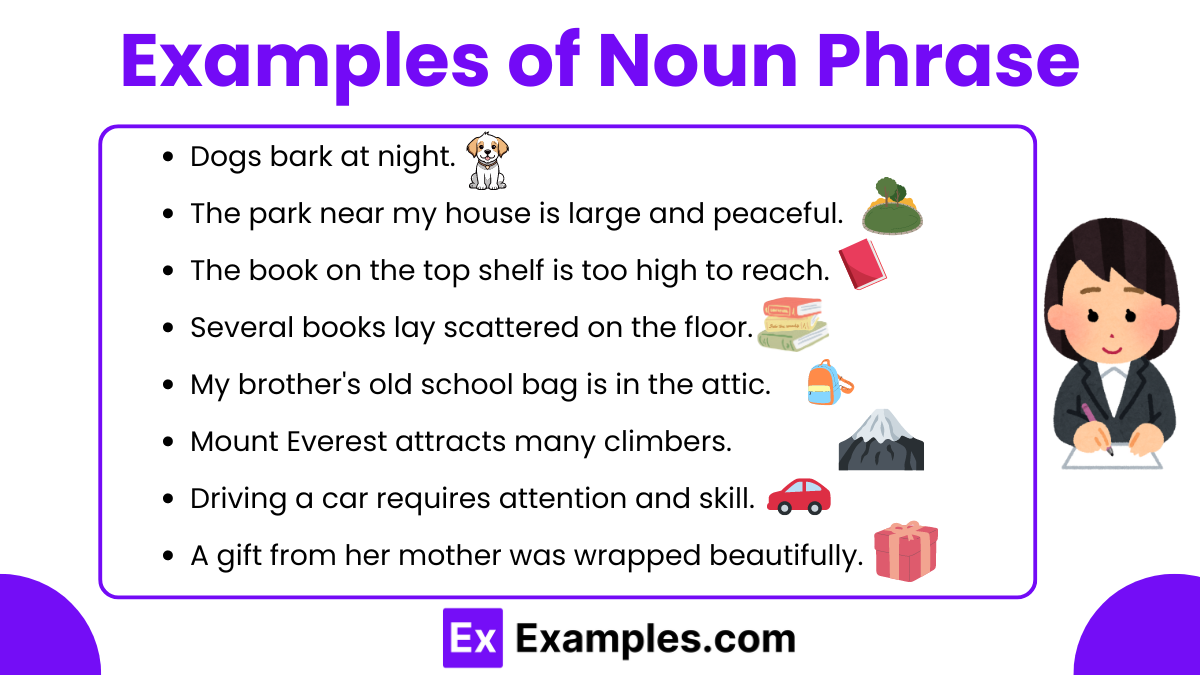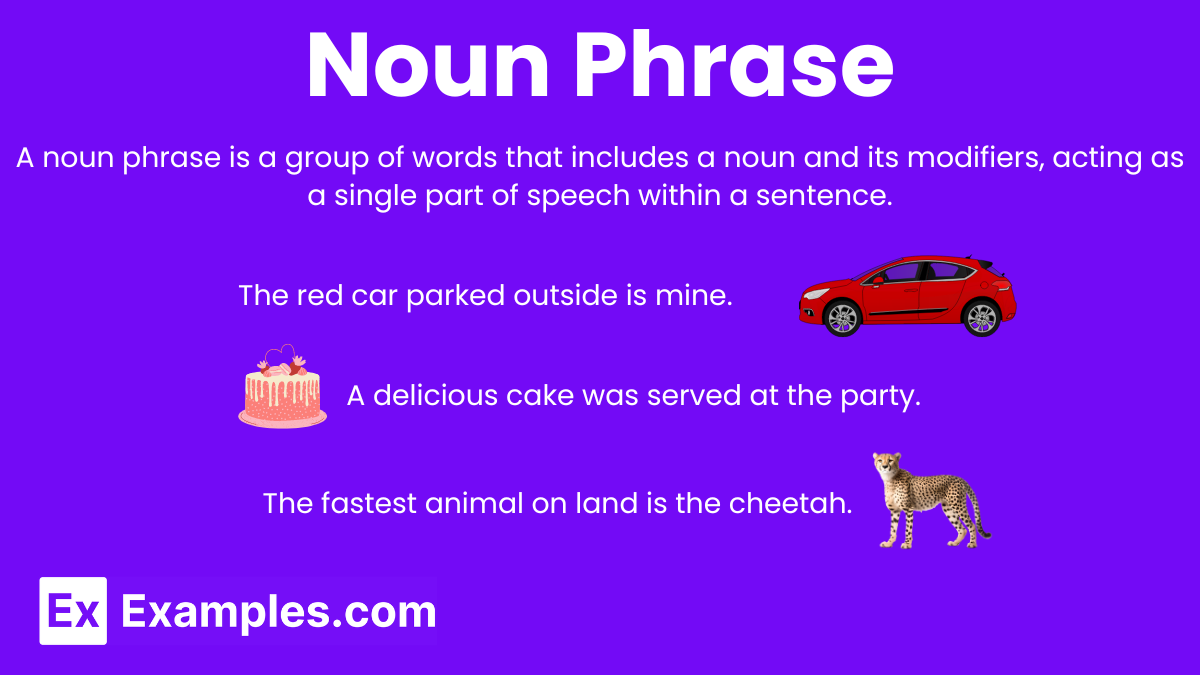30+ Noun Phrase Examples
A noun phrase is a group of words that functions in a sentence as a subject, object, or prepositional object. It includes a noun, which is a person, place, or thing, and may also include modifiers such as adjectives or determiners like ‘a’, ‘the’, or ‘some’. For example, in the sentence “The quick brown fox jumps over the lazy dog,” “the quick brown fox” and “the lazy dog” are both noun phrases. They provide more detail than just using a noun alone and are essential for adding information and variety to writing.
What is Noun Phrase?
Types of Noun Phrase
- Simple Noun Phrase
- Description: Contains only a noun or a pronoun, without any modifiers.
- Example: “Birds” in the sentence “Birds chirp early in the morning.”
- Proper Noun Phrase
- Description: Refers to specific names of people, places, or things that are always capitalized.
- Example: “Mount Everest” in the sentence “Mount Everest is the highest peak in the world.”
- Compound Noun Phrase
- Description: Features nouns made up of more than one word, often connected by a hyphen or space.
- Example: “Coffee table” in the sentence “Please put the books on the coffee table.”
- Prepositional Noun Phrase
- Description: Begins with a preposition followed by a noun phrase, adding context such as location or time.
- Example: “Under the bridge” in the sentence “They found shelter under the bridge.”
- Appositive Noun Phrase
- Description: Provides additional information or clarification about another noun next to it in the sentence.
- Example: “A great athlete” in the sentence “Usain Bolt, a great athlete, has won multiple Olympic medals.”
- Infinitive Noun Phrase
- Description: Starts with an infinitive form of a verb and functions as a noun.
- Example: “To swim” in the sentence “Her favorite activity is to swim.”
Examples of Noun Phrase

- Dogs bark at night.
- A delicious cake was served at the party.
- The blue car parked outside is mine.
- Several books lay scattered on the floor.
- My brother’s old school bag is in the attic.
- Mount Everest attracts many climbers.
- Los Angeles is known for its entertainment industry.
- Jennifer Aniston is a popular actress.
- The Atlantic Ocean is colder than the Pacific.
- The President of the United States resides in the White House.
- A red and gold scarf was found in the cafe.
- Team-building exercises are essential for workplace harmony.
- My grandmother’s recipe book contains many traditional dishes.
- The park near my house is large and peaceful.
- The chair with the broken leg should be repaired.
- A girl with a red hat stood there smiling.
- Birds chirping in the morning sound lovely.
- The idea of traveling around the world is exciting.
- The oldest tree in our neighborhood was cut down.
- Running marathons is a hobby for some.
- The book on the top shelf is too high to reach.
- The student with the highest grades won the scholarship.
- Driving a car requires attention and skill.
- To learn Spanish before visiting Spain is useful.
- Climbing mountains can be both challenging and rewarding.
- Sitting by the fireplace on a cold evening is cozy.
- Watching the stars at night is a calming activity.
- The movie starring Tom Hanks was a box office hit.
- A gift from her mother was wrapped beautifully.
- Playing video games is a popular pastime.
- The fastest animal on land is the cheetah.
- A big, old, haunted mansion stands at the hill’s crest.
- Eating healthy food is important for maintaining good health.
How to Use Noun Phrase
Noun phrases are versatile and can be used in various ways to enhance the complexity and specificity of sentences.
As the Subject of a Sentence
Noun phrases can act as the subject, performing or being associated with the action of the verb.
As the Object of a Verb
Use noun phrases as the direct object of an action verb or the object of a prepositional phrase to indicate the receiver of the action.
As a Complement
Employ noun phrases as subject complements following linking verbs to describe or provide additional information about the subject.
As an Appositive
Appositives are noun phrases that rename or provide extra details about a noun they accompany, adding descriptive depth or clarifying the noun’s identity.
For Adjectival Modification
Noun phrases can modify other nouns, functioning like adjectives to specify the type of the noun under discussion.
As Predicate Nominatives
With linking verbs, noun phrases can rename the subject, offering further identification or clarification.
Tips for Using Noun Phrase
- Start Strong: Begin sentences with noun phrases to introduce subjects clearly.
- Balance Detail: Use modifiers sparingly to maintain clarity without overloading your sentences.
- Link with Care: Use transition words like “furthermore,” “moreover,” and “consequently” to connect ideas smoothly.
- Vary Your Structure: Alternate between simple and complex noun phrases to keep your writing engaging.
- Enhance with Appositives: Add explanatory details using appositive noun phrases within sentences.
- Focus on Function: Utilize noun phrases as subjects, objects, and complements to diversify sentence structures.
- Check Alignment: Ensure noun phrases and verbs align in number and tense for grammatical consistency.
- Use Infinitives for Variety: Employ infinitive phrases as noun phrases to express purposes or intentions.
How do you identify a noun phrase?
Look for a group of words with a noun or pronoun as the core and modifiers like adjectives or determiners.
What Is a Noun Phrase for Kids?
A noun phrase is a small group of words containing a noun and its helpers, like “the blue car.”
How to Teach a Noun Phrase?
Introduce noun phrases by identifying nouns and gradually adding modifiers like adjectives and articles.
Are There Verbs in Noun Phrases?
Noun phrases do not contain verbs; they focus on nouns and modifiers like adjectives or determiners.
Can a Sentence Have Two Noun Phrases?
Yes, sentences can have multiple noun phrases, acting as different parts like the subject and object.
Does a Noun Phrase Need a Comma?
A noun phrase might need a comma if it’s non-essential information or part of a list.
Can a Noun Phrase Have a Conjunction?
Yes, a noun phrase can have a conjunction to link words or other phrases within it.
Can You Have a Preposition in a Noun Phrase?
Yes, prepositions can be part of noun phrases, linking them to other words in a sentence.
What Is an Example of a Noun Phrase?
An example of a noun phrase is “the quickly running fox,” where “fox” is the main noun.
What Is the Order of a Noun Phrase?
The typical order is determiner, adjectives, and the noun as the core of the phrase.



